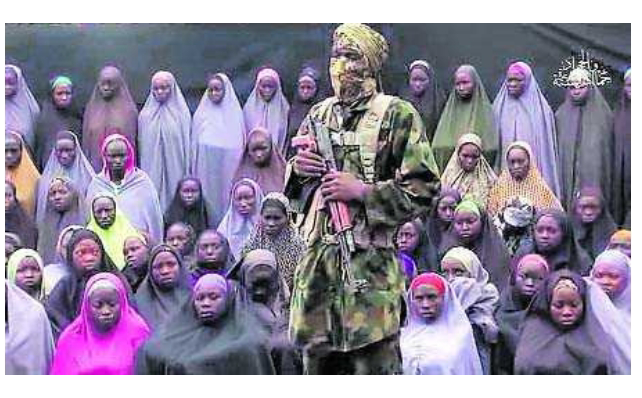Published On the Biafra Post
April ,15, 2024
Over 1,700 children abducted by gunmen since 2014; 17 mass school abductions recorded in six years; 20 released Chibok girls forced to marry former Boko Haram fighters.
The Nigerian authorities must ramp up efforts to ensure the safe release and return of the remaining 82 Chibok school girls abducted by Boko Haram fighters in 2014, and ensure schools are protected from child abductions, which have become increasingly frequent in the decade since the notorious raid by the armed group in northern Nigeria, said Amnesty International.
Today marks 10 years since 276 girls were abducted from Chibok secondary school in Borno state on 14 April 2014. Since then, Amnesty International has documented at least 17 cases of mass abductions in which at least 1,700 children were seized from their schools by gunmen and taken into the bush, where, in many cases, they were subjected to serious abuse, including rape.
“It is shocking that in the 10 years since the Chibok school abduction, the Nigerian authorities have not learned any lessons or taken effective measures to prevent attacks on schools. The number of abductions that have taken place since 2014, including as recently as last month, and the fact that hundreds of children are still in the custody of gunmen, shows the lack of political will by the authorities to address the problem,” said Isa Sanusi, Director of Amnesty International Nigeria.
“The abduction of children and attacks on schools may amount to war crimes. It is the duty of the Nigerian authorities to end these attacks and bring the suspected perpetrators to justice through fair trials and ensure access of victims to justice and effective remedies. A decade is enough time for the Nigerian authorities to find a solution to this problem, but so far, the reality shows the government has neither the will nor the commitment to end these attacks on children and their schools.”
The Safe Schools Initiative to improve security around schools was launched in the aftermath of the Chibok abductions. However, its implementation has been bogged down by bureaucratic roadblocks and allegations of corruption. As a result, many northern states have closed hundreds of schools indefinitely, disrupting the education of thousands of children.
Investigations by Amnesty International reveal that the state of education in Chibok and its surrounding communities, is still being impacted by the 2014 abductions.
The Borno state government rebuilt the Government Girls Secondary School Chibok, which was completely burnt down by Boko Haram in 2014, and set up day secondary schools and a technical school in Chibok. However, academic activities in the schools remain minimal because parents are still skeptical of sending their children to school, for fear of being abducted by Boko Haram.
Forced to marry their abductors
Amnesty International is also calling on the Nigerian authorities to promptly, thoroughly, impartially, independently, transparently and effectively investigate allegations of forced marriage between 20 Chibok women rescued in the last two years and former Boko Haram fighters in a centre provided by Borno state government in Maiduguri. The father of one of the women confirmed to Amnesty International that the forced marriages had taken place.
A parent of one of the girls forced into marriage with former Boko Haram fighters told Amnesty International: “I do not want a situation whereby if I speak, the government or Boko Haram will say we are conniving with others to expose issues to the public. I can speak on anonymity but will not still share everything.”
Borno state government claims these Boko Haram fighters have undergone rehabilitation and been reintegrated into society under the government’s conflict recovery programme for repentant Boko Haram fighters.
“It is appalling that these freed Chibok girls were forced to marry and live with their abductors. Organized by the Borno state government, these forced marriages are apparently an attempt to appease Boko Haram fighters with complete disregard for the rights and mental wellbeing of the girls involved,” said Isa Sanusi.
The parents and relatives of the girls who remain in captivity said they have been abandoned by government, citing the lack of information about attempts to ensure the safe release of their children from Boko Haram.
The Nigerian authorities must deliver on its national and international human rights obligations by immediately redoubling efforts to ensure the safe release and return of not only the 82 Chibok girls abducted 10 years ago, but also all people held captive by gunmen across Nigeria.
“As we mark the anniversary of these abductions, the Nigerian government must put in place a comprehensive and effective plan to protect schools and children. Authorities must also prioritize helping girls who escaped or were rescued from Boko Haram, to rebuild their lives. They must not ignore the ongoing anguish of the parents whose daughters remain in captivity and ensure they are regularly briefed on efforts to ensure the safe release and return of their children,” said Isa Sanusi.
In a report to be published next month, Amnesty International will document crimes and violations committed by Boko Haram and the Nigerian military against girls associated with, or perceived to be associated with, Boko Haram since the start of the conflict in north-east Nigeria in 2013. The report will also detail their unique reintegration needs and their aspirations to rebuild their lives.
Background
In April 2014, 276 schoolgirls were abducted from a government secondary school in Chibok, a town in Borno State. Some of the girls escaped captivity on their own, while others were later released following intense campaigning efforts by civil society organizations and negotiations by the government.
Of those initially abducted, however, 82 girls remain in captivity, while several children have been abducted in subsequent attacks. Amnesty International has been documenting Boko Haram’s atrocities and targeting of schools since 2012. In May 2020, Amnesty International also published a report on the dire impact of the conflict in Northeast Nigeria on children.




Post A Comment:
0 comments: